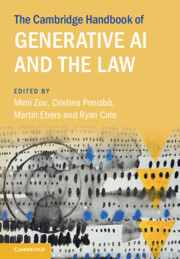Book contents
- Frontmatter
- Contents
- Figures
- Tables
- Contributors
- Foreword
- Preface
- Part I Understanding Generative AI from Multidisciplinary Perspectives
- Part II Evolving Regulatory and Governance Frameworks
- Part III Generative AI
- 14 Generative AI and Non-discrimination Law in the EU
- 15 Generative AI and Data Protection
- 16 Generative AI and the Fundamental Limitations of US Privacy Law
- 17 Generative AI and IP Under US Law
- 18 Copyright and Generative AI in Japan and China
- 19 Redefining Rivalry
- 20 Regulating Hypersuasion
- 21 Generative AI Systems and Corporate Governance, Compliance and Liability
- 22 Generative AI and Criminal Guilt
- Part IV The Use of Generative AI in Legal and Related Sectors
15 - Generative AI and Data Protection
from Part III - Generative AI
Published online by Cambridge University Press: 08 August 2025
- Frontmatter
- Contents
- Figures
- Tables
- Contributors
- Foreword
- Preface
- Part I Understanding Generative AI from Multidisciplinary Perspectives
- Part II Evolving Regulatory and Governance Frameworks
- Part III Generative AI
- 14 Generative AI and Non-discrimination Law in the EU
- 15 Generative AI and Data Protection
- 16 Generative AI and the Fundamental Limitations of US Privacy Law
- 17 Generative AI and IP Under US Law
- 18 Copyright and Generative AI in Japan and China
- 19 Redefining Rivalry
- 20 Regulating Hypersuasion
- 21 Generative AI Systems and Corporate Governance, Compliance and Liability
- 22 Generative AI and Criminal Guilt
- Part IV The Use of Generative AI in Legal and Related Sectors
Summary
Generative AI has catapulted into the legal debate through the popular applications ChatGPT, Bard, Dall-E, and others. While the predominant focus has hitherto centred on issues of copyright infringement and regulatory strategies, particularly within the ambit of the AI Act, it is imperative to acknowledge that generative AI also engenders substantial tension with data protection laws. The example of generative AI puts a finger on the sore spot of the contentious relationship between data protection law and machine learning built on the unresolved conflict between the protection of individuals, rooted in fundamental data protection rights and the massive amounts of data required for machine learning, which renders data processing nearly universal. In the case of LLMs, which scrape nearly the whole internet, this training inevitably relies on and possibly even creates personal data under the GDPR. This tension manifests across multiple dimensions, encompassing data subjects’ rights, the foundational principles of data protection, and the fundamental categories of data protection. Drawing on ongoing investigations by data protection authorities in Europe, this paper undertakes a comprehensive analysis of the intricate interplay between generative AI and data protection within the European legal framework.
Information
- Type
- Chapter
- Information
- The Cambridge Handbook of Generative AI and the Law , pp. 237 - 254Publisher: Cambridge University PressPrint publication year: 2025
